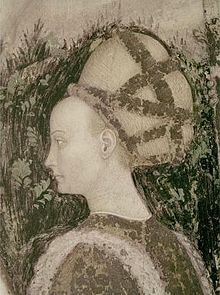Maria of Trebizond
| Maria of Trebizond | |
|---|---|
 Maria, depicted in the fresco Saint George and the Princess by Pisanello | |
| Byzantine Empress consort | |
| Tenure | September 1427 – 17 December 1439 |
| Born | Trebizond |
| Died | 17 December 1439 Constantinople |
| Burial | Pantokrator monastery |
| Spouse | |
| Dynasty | Komnenos |
| Father | Alexios IV of Trebizond |
| Mother | Theodora Kantakouzene |
| Religion | Christianity |
| Palaiologan dynasty | |||
| Chronology | |||
| Michael VIII | 1259–1282 | ||
| with Andronikos II as co-emperor, 1261–1282 | |||
| Andronikos II | 1282–1328 | ||
| with Michael IX (1294–1320) and Andronikos III (1321–1328) as co-emperors | |||
| Andronikos III | 1328–1341 | ||
| John V | 1341–1391 | ||
| with John VI Kantakouzenos (1347–1354), Matthew Kantakouzenos (1342–1357) and Manuel II (1373–1391) as co-emperors | |||
| Usurpation of Andronikos IV | 1376–1379 | ||
| Usurpation of John VII | 1390 | ||
| Manuel II | 1391–1425 | ||
| with Andronikos V (1403–1407) and John VIII (ca. 1416–1425) as co-emperors | |||
| John VIII | 1425–1448 | ||
| Constantine XI | 1448–1453 | ||
| Succession | |||
| Preceded by Laskarids of Nicaea |
Followed by Ottoman conquest | ||
Maria Megale Komnene (Greek: Μαρία Μεγάλη Κομνηνή; died 17 December 1439), known as Maria of Trebizond (Greek: Μαρία της Τραπεζούντας), was a Byzantine Empress consort by marriage to the Byzantine emperor John VIII Palaiologos (r. 1425–1448).[1] She was the last Byzantine empress.
She was one of three daughters of Alexios IV of Trebizond and Theodora Kantakouzene.
Life[]
In September, 1427, Maria was married to John VIII Palaiologos by Patriarch Joseph II[2] in Constantinople, having arrived by ship from Trebizond on the last day of August; the connection had been negotiated through ambassadors sent from Constantinople the previous year.[3] The calls her Maria Katakouzene (Katakouzene was a variant of Kantakouzene) and extols her exceptional beauty which caused John VIII to love her dearly.[4]
Bertrandon de la Brocquière, who saw her in Constantinople in 1432, likewise praised her beauty, stating, "I should not have had a fault to find with her had she not been painted, and assuredly she had not any need of it."[5]
The Spanish traveller Pero Tafur met Maria November 1437 when he visited Constantinople, and gives us a glimpse into her daily life. During his stay at Constantinople, Tafur found she often went hunting in the adjacent countryside, either alone or with the Emperor.[6] He adds that he met her elder brother, Alexander, in that city, where he lived "in exile with his sister, the empress, and they say that his relations with her are dishonest."[7] When Pero Tafur returned to Constantinople a few months later, he asked to be shown the Hagia Sophia, his hosts included not only the Despot Constantine, but Maria and her brother Alexander, all of whom had wanted to hear Mass there.[8]
Maria's marriage with John lasted twelve years but resulted in no children. Sphrantzes records the date of her death, while John was away in Italy at the Council of Florence;[9] Steven Runciman attributed her death to bubonic plague.[10] She was buried in the church of the Pantokrator monastery in Constantinople. John Eugenikos, brother of Mark Eugenikos of Ephesus, composed a lament for her death.[4]
After Maria's death John never remarried and died childless on 31 October 1448. He was succeeded by his younger brother Constantine XI, who became the last emperor. Constantine was a widower when he ascended to the throne and never married again,[11] leaving Maria the last empress.
Primary sources[]
- Doukas, History
- George Sphrantzes, Chronicle
References[]
- ^ William Miller is error saying she "married the Byzantine Emperor John VI., just as her aunt Eudokia had married his grandfather John V": John VI Kantakouzenos was co-emperor with John V. This mistake is easily explained by the loss of two characters, either by Miller's pen or the typesetter's fingers. Trebizond: The last Greek Empire of the Byzantine Era: 1204-1461, 1926 (Chicago: Argonaut Books, 1969), p. 80
- ^ Doukas, 20.7; translated by Harry J. Marguoulias, Decline and Fall of Byzantium to the Ottoman Turks (Detroit: Wayne State University, 1975), p. 114
- ^ Chronicle 14:3-4; translated by Marios Philippides, The Fall of the Byzantine Empire: A Chronicle by George Sphrantzes, 1401-1477 (Amherst: University of Massachusetts, 1980), p. 30
- ^ a b Donald M. Nicol, The Byzantine family of Kantakouzenos (Cantacuzenus) ca. 1100-1460: a genealogical and prosopographical study (Washington, D.C.: Dumbarton Oaks Center for Byzantine Studies, 1969), p. 171 and note
- ^ de la Brocquière, Early Travels in Palestine; cited in William Miller, Trebizond: The last Greek Empire of the Byzantine Era: 1204-1461, 1926 (Chicago: Argonaut, 1969), pp. 80f
- ^ A. Vasiliev, "Pero Tafur, a Spanish Traveler of the XVth Century and His Visit to Constantinople, Trebizond, and Italy", Byzantion 7 (1932), p. 95
- ^ Vasiliev, "Pero Tafur", p. 98
- ^ Vasiliev, "Pero Tafur", p. 103
- ^ Chronicle, 24.3; translated by Philippides, The Fall, p. 52
- ^ Runciman, The Fall of Constantinople, 1453 (Cambridge: University Press, 1965), p. 21
- ^ Runciman, Fall of Constantinople, p. 521
External links[]
- Cawley, Charles, Her listing, along with her husband, ., Medieval Lands database, Foundation for Medieval Genealogy
- [1] Portrait by Pisanello thought possibly a portrait of Maria.
- 1439 deaths
- Grand Komnenos dynasty
- Palaiologos dynasty
- Byzantine empresses
- 15th-century deaths from plague (disease)
- 15th-century Byzantine women
- Princesses of Trebizond